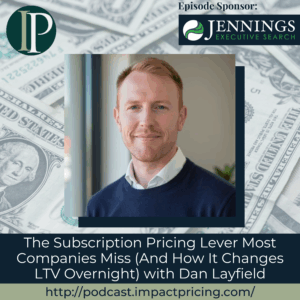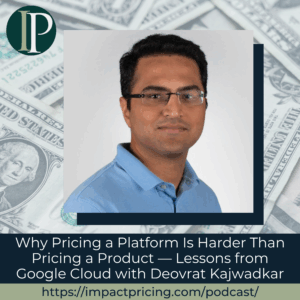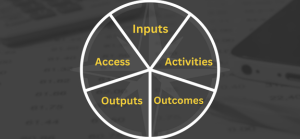
In this episode, Mark and Orvel Ray talk about the former’s newly released book, Selling Value, as they both share stories in all ways connected to his account.
Podcast: Play in new window | Download
Why you have to check out today’s podcast:
- Learn about the importance of translating what matters to your customer into something of real value, like measurable dollars
- Discover what the book, Selling Value, is trying to show salespeople
- Find out how the Guerilla series was able to move a lot of people, including product managers, product marketing, and other VAs
“If you’re closing more than about 70% of your opportunities, you’re not charging enough.”
– Orvel Ray Wilson
Topics Covered:
01:55 – The story of how Mark and Orvel Ray met
02:40 – Working with Mark for his book, Selling Value: Taking note of what’s important to your customers
06:19 – What the book is showing salespeople how to do + how the ‘Will I? In which one?’ concept came to exist
10:03 – Orvel Ray’s friend, Jordan, who was able to close an $85,000 deal as he learns from Mark’s book
14:59 – Why should salespeople and pricing people care about selling value?
18:14 – Send Orvel Ray a message and get one free hour of free consultation on how to become a speaker and/or an author.
19:20 – Orvel Ray’s piece of pricing advice
21:43 – What anchoring is all about
Key Takeaways:
“Salespeople need to understand how this really works, not only to convey and do the math and show them that this is a good investment, but to do that in terms that are important to them.” – Orvel Ray Wilson
“I might have 100 good reasons why you should buy my product, but your decision is going to hinge on the three or four reasons that you think are important. And if you can isolate what those are and sell to those, then two things happen – one, the sales process is a lot simpler, and your offering is going to be irresistible.” – Orvel Ray Wilson, Guerilla Selling
“Many times, we fail, we lose the sale, not because our product isn’t a good fit, or because we don’t have superior technology, or aggressive pricing, but simply because we haven’t got the customer to make the ‘will I?’ decision in the first place.” – Orvel Ray Wilson
“Just putting this technology in the hands of your sales team is going to make an immediate and measurable impact, as I’ve already said, and certainly more so than any other sales book I’ve read recently; and I’ve read them all.” – Orvel Ray Wilson
“Build value, include everything, load up the table like it’s Thanksgiving dinner, and then if you have to talk about reducing your fees, you can take things off the table and still defend your value.” – Orvel Ray Wilson
People / Resources Mentioned:
- Selling Value: https://www.amazon.com/Selling-Value-Deals-Higher-Prices/dp/1737655217/
- Houghton Mifflin: https://www.hmhco.com/
- Guerilla Selling: https://www.amazon.com/Guerrilla-Selling-Unconventional-Weapons-Increasing/dp/0395578205/
- Impact Pricing: https://www.amazon.com/Impact-Pricing-Blueprint-Driving-Profits/dp/1483489701/
- Patricia Fripp: https://www.youtube.com/user/PatriciaFripp
Connect with Orvel Ray Wilson:
- LinkedIn: https://www.linkedin.com/in/orvelray/
- Email: [email protected]
- Website: https://guerrillagroup.com/
Connect with Mark Stiving:
- LinkedIn: https://www.linkedin.com/in/stiving/
- Email: [email protected]
Full Interview Transcript
(Note: This transcript was created with an AI transcription service. Please forgive any transcription or grammatical errors. We probably sounded better in real life.)
Orvel Ray Wilson
If you’re closing more than about 70% of your opportunities, you’re not charging enough.
[Intro]
Mark Stiving
Today’s podcast is sponsored by Jennings Executive Search.
I had a great conversation with Jon Jennings about the skills needed in different pricing roles. He and I think a lot alike.
If you’re looking for a new pricing role or if you’re trying to hire just the right pricing person, I strongly suggest you reach out to Jennings Executive Search. They specialize in placing pricing people. Say that three times fast.
Mark Stiving
Welcome to Impact Pricing, the podcast where we discuss pricing, value, and the guerilla relationship between them. I’m Mark Stiving. Today, our guest is Orvel Ray Wilson. And here are three things you’d want to learn about Orvel Ray before we start.
He is co-author of the book Guerilla Selling, and several other Guerilla books. He is a Certified Speaking Professional, which is the National Speakers Association’s equivalent to an Eagle Scout, which means he was really, really good at one point in time. And he is my personal business coach.
Welcome, Orvel Ray.
Orvel Ray Wilson
Thank you, Mark. That is, to me, the most unusual introduction I’ve ever had. Once an Eagle Scout, you’re always an Eagle Scout, right?
Mark Stiving
Exactly.
Orvel Ray Wilson
The eagle has landed. Yes.
Mark Stiving
They always teach you at NSA to read someone’s bio or intro the way they give it to you. Luckily, I didn’t ask you for one.
Orvel Ray Wilson
Yeah. You just made stuff up. That’s funny.
Mark Stiving
Okay. So, I start every one of my podcasts out with the question, how did you get into pricing, and would you ever say that you’re into pricing, or is it just because you met me that you think about pricing?
Orvel Ray Wilson
I was because I met you. We met at the National Speakers Association rink in Las Vegas, and I was doing a masterclass on storytelling for NSA, and we started talking about pricing at one of the breaks. I’m like, I’ve been in sales and marketing for 40 years, and why have I not had this conversation? I’d never heard about this. This was fascinating. And so, that’s how we got started, and yeah. So, one thing led to another, and you ended up writing this great book.
Mark Stiving
Well, thank you. By the way, for our audience, what Orvel Ray and I are going to do today is talk about my new book, Selling Value, and what you need to know is I worked really hard to write this book. Orvel Ray actually worked really hard at editing it, making sure I did it well, he helped me record the audio book; he has just been amazing in terms of helping me through the process.
So, Orvel Ray, how did you learn all this stuff?
Orvel Ray Wilson
Yeah, I learned it the hard way, and I have the canceled checks to prove it. I don’t know. I started way back in 1980 when I met Jay Levinson, who was the original author of the original Guerilla Marketing, published back in 1984. His publisher, Houghton Mifflin, wanted to do a sequel for salespeople on the rationale that there are more salespeople in the world than marketing people, and so we released Guerilla Selling in 1991. It became a runaway best-seller, and we wound up producing about one new Guerilla Marketing book every six months for several years. The series now includes 58 titles in 63 languages, the best-selling marketing series in publishing history, and Guerrilla Selling has been a landmark. So yeah, I traveled all over the world, doing seminars and coaching and training with little companies you might have heard of, like Apple and IBM. Yeah, I had a great run with that.
And so, when we started talking about taking what you are doing with pricing and applying that to sales, that really lit me up, because no one had ever had that conversation before. I was like, salespeople need to understand how this really works, not only to convey and do the math and show them that this is a good investment, but to do that in terms that are important to them.
One of the central tenants of Guerrilla Selling was figure out what motivates this particular customer and appeal to that. The line was, I might have 100 good reasons why you should buy my product, but your decision is going to hinge on the three or four reasons that you think are important. And if you can isolate what those are and sell to those, then two things happen – one, the sales process is a lot simpler, and your offering is going to be irresistible.
And so, this whole discussion of selling value, how do you analyze and communicate and package that back to your customer as a fundamental approach to selling methodology, that, I thought, I recognized that immediately as a radical, new addition to the genre, to the technology that everyone should understand.
Mark Stiving
It’s interesting that you say it that way, because I’ve never heard you talk about the book Guerilla Selling before, and I thought that was really fascinating that here are these 100 things, and three things matter to this person.
Orvel Ray Wilson
Right.
Mark Stiving
And if you think about it, that’s really what we wrote in Selling Value as well. And that is, there are lots and lots of different ways that buyers can get value from our products. What we need to do is understand what the possibilities are, and then go talk to individual buyers, and once they say, “Oh, this is what matters to me,” we now have the business acumen or the capability to somehow translate that into real value, into dollars to our customers.
Orvel Ray Wilson
And yeah, one of the things that really resonated for me is the way that you turn the tables on that. Companies put together, features benefit tables, and value tables, or ROI calculators, or spreadsheets for their sales team to use. And one of the key insights in this book is that they don’t trust those. The customer does not trust your ROI calculator, because they’ve assumed that you’ve had the numbers and it’s all a big con. Well, not in this case, in some cases, but they have reason to be suspicious of your numbers.
And you, actually in this book, you spell out the questions to ask, so that they create the formula, they establish the baseline, and do the arithmetic. You know, customers never argue with their own data. And so, what this book shows salespeople how to do is to walk their customer through the process of analyzing and quantifying the value that’s ultimately going to justify the purchase.
Mark Stiving
So, one way you can think about that is we help salespeople understand how to help their customers create their very own ROI calculator. So instead of walking in and saying, “Here’s your ROI calculator,” we just walk the customer through creating their own.
Orvel Ray Wilson
Right.
Another thing that really excited me about this is this idea of the customer journey. What really kind of hit me between the eyes was this concept of ‘Will I? In which one?’ that every customer makes two decisions, and the first is will I buy something in this category, and then, separate decision, well, among the various options and possibilities, which one is going to be the best process for me, the best option, the best solution. And many times, we fail, we lose the sale, not because our product isn’t a good fit or because we don’t have superior technology or aggressive pricing, but simply because we haven’t got the customer to make the ‘will I?’ decision in the first place. And I thought that was a really illuminating concept as well. That’s something I’ve never seen in 40 years, traveling the world as a celebrity sales trainer. It just hit me between the eyes on. Man, this is really useful.
Mark Stiving
It’s funny when I was writing my very first book, Impact Pricing, I was just thinking about all the things I knew about pricing and all the situations, and typically, the way I handle all of this is I’ll find a situation and say, “How does that apply to all these frameworks that I use? Oh, it doesn’t apply. I need a new framework. I need a way to think about that.”
And I was working for National Semiconductor at the time. We had some products where we were unique, we didn’t have any competition, and we could charge really high prices. And we had other products where we had tons of competition and we couldn’t charge really high prices. And I started thinking about that from the customer, the buyer’s perspective, and how can we get away with that, and that’s where I came up with this ‘Will I? In which one?’ concept, which was pretty interesting.
I’ve been teaching that to pricing and product management people for 25 years now, but I’d never thought to apply it to sales. And when you get excited hearing about this stuff, it makes me just giddy. It’s like, “Oh, here’s this guy who knows sale really, really well, and he loves this stuff.”
Orvel Ray Wilson
Well, if I could share a story with you, as soon as we uploaded the files to Amazon, the first thing I did was order a copy of the book as a test, just to make sure that everything was laid out correctly, and we dotted all the T’s and crossed all the I’s, and everything was working.
I have a dear friend, Jordan, who runs a boutique landscape company here in Boulder for many years, and he’s a great salesman, and really, just a brilliant landscape architect in his own right, and does his beautiful color pencil renderings, and he’s also a very brilliant musician. And as you know, I lead a double life as a big man leader, a drummer. And so, he was up here at the studio a couple of weeks ago, and he always pumps me for sales training ideas whenever we get together. And so, he was telling me about this customer he was having some difficulty. They were kind of on the fence, he wasn’t sure. And I said, “Jordan, you got to read this book.” And I gave him first off, the press copy of the book that I had bought, and sent it home with him.
A couple days later, I called to say, “How are you coming along, reading the book?
And he said, “Not so good. Actually, I’m not that good of reader.” So, as I have been finishing the mastering of the tracks for the audio version, I have been emailing them to him, one at a time, spoon feeding him, that says, “Listen to this in the car.” So, every day, he gets another chapter. And I just saw him, Sunday, he was giddy, because he had just that morning closed an $85,000 deal. His average sale is about $30,000.
So, when I see that kind, and we are on like Chapter 8 of 14 now, we’re not even barely halfway through the book, and he’s already making money with this. When I see that kind of instant efficacy in a how-to book, when you can hand it to somebody and immediately start making money with it, that really excites me. The value in the utility of that is just. There’s so few books these days that are that actionable and practical. And it’s not high tech, he’s not selling semiconductor testing equipment or a bottling machine factory or some of the examples you’ve talked about. He’s selling landscaping. This is about as blue collar as it gets. And this was instantly transformational for him.
Mark Stiving
Yeah. I think, since you bring that up at the end, by the way, I love the story. Thank you for sharing that. That is so cool. But my favorite thing – there’s no doubt – my favorite thing in the world, besides making money, my favorite thing in the world is helping somebody who then comes back later and says, “Oh my God, did you see the impact this had?”
I have one lady who wrote a LinkedIn review for me or testimonial. She said, “He doubled my income last year.” It’s like so rewarding to know that you can help people with this.
Orvel Ray Wilson
I know.
Mark Stiving
I love that. But what I was going to suggest is this guy’s a landscaper. He’s probably selling more B2C, and even if you were selling to businesses, it’s going to be pretty hard to turn landscaping into dollar value to a customer.
Orvel Ray Wilson
Actually, he hasn’t had any problem with that at all, because he said he switched over from “Oh, you want this? Yeah, we can do that.” “Oh, you want a flagstone walkway? Yeah, we can do that.” “Oh, you want to put up a berm with pine trees? Yeah, we can do that.” “Yeah, we can do that.” “Yeah, we can do that.” And instead, he’s turned his approach around to, “You know, look, the cost of concrete is doubled, the cost of trees is up 50%, the cost of sod has tripled. If you don’t do this now, a year from now, it’s going to cost you another $50,000, and for every dollar that you put to invest in your home now, you’re going to get back double or triple in the next three or four years.” And he can show the Zillow numbers, before and after on projects that he went back and had done, to actually do that, because he took your advice to heart; how do you quantify. “Oh, we want a nice area where we can entertain outdoors,” and instead, boiling that down to the dollars and cents, “This is a good investment and you should do it now. This is cash in the bank; it’s going to give you a better return than the stock market.” And it’s working for him brilliantly.
Mark Stiving
Nice. I actually hadn’t thought of that. I’m glad he did.
Orvel Ray Wilson
No, he’s just doing what you say. You take the non-tangible value and turn it into quantified. Keep asking the question. How do you measure that and translate it into measurable dollars?
Mark Stiving
Well, I think that’s fabulous. Absolutely fabulous.
So normally, I write to pricing people, product management people, and this book- by the way, early in my career, I was a salesperson, and I was horrible, so that’s why I went into pricing and being a professor and everything.
Orvel Ray Wilson
Yeah.
Mark Stiving
But now, here we are, very end, towards the end of my career, what I want to do, I just said, can I take everything I know and apply it to sales? Because it feels to me like salespeople need to truly understand what value means to their customers, as pricing people were always pressured-
Orvel Ray Wilson
Wait a minute. Since this is a podcast for pricing people, why should they care about selling value?
Mark Stiving
Yeah. I think the biggest issue is pricing people inside big companies have to deal with lots and lots of different departments. And one of those departments, we often deal with the salespeople. And the question always, well, let me start with we make fun of salespeople. Salespeople discount too often. They don’t want to sell the value; they don’t want to take the time. All they know how to do is discount. And that isn’t really true, by the way. But what is really true is that salespeople don’t know how to sell value. And I think if we, as pricing people, as product managers, as product marketers, if we can help salespeople learn how to sell value, we’re going to do a much better job at achieving higher average selling prices for our company, right? Which is really what we’re trying to get accomplished.
So, yeah. This would be a great book for pricing people, product managers, product marketers. I think it’s an even better book for you to buy and give to your sales team.
Orvel Ray Wilson
Yes, well, we certainly did. Many companies did that with Guerilla Selling. Pfizer, for example, bough somebody 7000 copies of the book for all of their sales team. There was a major hotel chain, Hotels International, that gave a copy of Guerilla Selling to some 50,000 travel agents around the world, and said, “Read this book.”
So, just putting this technology in the hands of your sales team is going to make an immediate and measurable impact, as I’ve already said, and certainly more so than any other sales book I’ve read recently; and I’ve read them all. I tried to, anyway.
Mark Stiving
Well, all I can say is thank you for all the hard work you put into this.
Orvel Ray Wilson
It’s been a pleasure, right? Very few projects that I do for clients, and I don’t know, this is probably the serious book that I coach someone through. But of all of them, this has been one of the most exciting for me, I think part just because it’s so close to my own kind of home base and my own life’s work in helping salespeople. But yeah, it’s really cool. And we’ll have the audio version available very, very soon. We’ll just, as they say in the software business, “Coming soon.”
Mark Stiving
Well, we’re not sure when this podcast gets released anyway, so the audio book might be out already.
Orvel Ray Wilson
Yeah. Probably.
Mark Stiving
Who knows?
So, Orvel Ray, you have just been amazing as a business coach for me in so many ways. By the way, just so everybody knows, Orvel Ray not only helps me with the book, which he’s done a fantastic job. He helps me strategize my business. He tries to make me a better speaker. I don’t know that that works so well.
Orvel Ray Wilson
You’re a great speaker.
Mark Stiving
But he’s just an amazing business coach. I’m thrilled that I found him and that he’s working with me. And by the way, he also told me that if anybody who wants to do their own business, be a speaker, and author, he would give you a free hour just for reaching out to him.
Orvel Ray Wilson
Just for asking. Sure. That’s what I do. You know, after 40 years on the International Circuit, I’m now at that stage in my career where I just wanted to give back as much as I can to the next generation coming up. So, if you send an email to orvelray@guerillagroup- No, it’s too hard to spell. O-R-V-E-L-R-A-Y. [email protected]. I’ll send you a link and we’ll get together on Zoom and explore the possibilities, see what you got.
Mark Stiving
Cool.
Orvel Ray Wilson
I’m happy to help any way I can.
Mark Stiving
You answered my last, last question before I asked it, so now I’m going to ask my second the last question, and I didn’t prep you for this; This is going to be hard, Orvel Ray.
What’s one piece of pricing advice you would give our listeners that you think could have a big impact on their business?
Orvel Ray Wilson
Charge more.
Mark Stiving
Oh, I love it.
Orvel Ray Wilson
Just charge more. Most of the people that I work with, the biggest mistake that aspiring speakers make is that they set their fees too low right out of the box. In the industry, anything less than about $2,500 labels you as an amateur. The spot for that kind of work is around 5$,000 to $10,000. We’re talking about for like a half day seminar, breakout session, general session, keynote, or maybe even a full day sales meeting. Writing a book, you can double that number. So now that your book is out, you’re going to have to double your fees.
Mark Stiving
Uh oh. I’ve never been shy about my fees. Let me assure you.
Orvel Ray Wilson
Right. If you’re closing more than about 70% of your opportunities, you’re not charging enough. You can always negotiate down. One of the things that you talked about in this book is the idea, the set point, that if you quote a big number, we killed 3 million bugs a day, that’s an exterminating service, and our subscription service is only $2,000 a month and we’ll do your whole office building. Now, that price, whatever that is, sounds a lot more reasonable.
And so, one of the scripts we teach is we start the conversation at, and then name the biggest number that you can say out loud without choking on it. And then, continue the conversation from there. You can always negotiate down.
So, build value, include everything, load up the table like it’s Thanksgiving dinner, and then if you have to talk about reducing your fees, you can take things off the table and still defend your value.
Mark Stiving
Just so everybody knows the effect that Orvel Ray was talking about was called anchoring, and it’s in the Behavioral Economics chapter of the book.
And so, I want to pile on to what you just said. Every time I raise my fees and I quote it to somebody, inside, you get this little twinge of, “Oh, that was too much,” and then when they go, “Oh, that seems reasonable.” You’re just like, “Uhuh, that felt great!”
Orvel Ray Wilson
Oh, yeah. That’s right. Sure.
Mark Stiving
So, I think, many of us, especially if we sell our own time or our own brand, we think that people saying yes or no impacts our self-worth or our confidence. And in truth, we just have to get used to saying, “Hey, if they don’t want to pay my fee, that’s totally okay. Doesn’t bother me.”
Orvel Ray Wilson
Well, there’s a flipside, too. If you’re charging $100 a minute just for them to listen to you talk, you better have something to say. Patricia Fripp taught me that. You better not waste a breath. You better not waste a syllable. You better be on and have done your homework and prepared thoroughly and rehearsed completely and deliver value at the level of fees that you just raised to, and that makes you better over time, and so, it becomes a self-fulfilling cycle of value in price overtime.
Mark Stiving
Yup. Absolutely right.
Orvel Ray Wilson
But we’re wrapping because of time.
Mark Stiving
This has been so much fun. Thank you very much for participating with us today. I normally ask, if anyone wants to contact you, how can they do that? So, you’ve already done that.
Orvel Ray Wilson
If they have a pencil, I’ll give you a toll free number you can call as well.
Mark Stiving
Go ahead.
Orvel Ray Wilson
800-247-9145, and you call me a Luddite. Yes, we still have a landline here. And I work from home, so I’ll answer it personally. I look forward to having a conversation.
Mark Stiving
You live in the middle of the boonies. Do they even have cell reception out there?
Orvel Ray Wilson
Barely sort of, kind of via the internet, so we have to have a special transmitter in the other room that makes the cell phones work.
Mark Stiving
Nice.
Episode 172 is all done. Thank you so much for listening.
If you enjoyed this, would you please leave us a rating and a review? Remember, our goal is to help you win more business at higher prices, which by the way is the tagline of the book, Selling Value, so if you have any questions or comments about this podcast or pricing in general, feel free to email me: [email protected].
Now, go make an impact.
Mark Stiving
Thanks again to Jennings Executive Search for sponsoring our podcast. If you’re looking to hire someone in pricing, I suggest you contact someone who knows pricing people. Contact Jennings Executive Search.
















